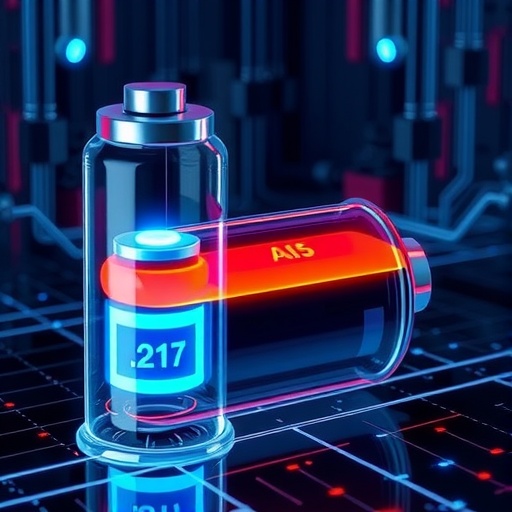In the rapidly evolving field of energy storage, the exploration of battery technology has become paramount. As we dive deeper into optimizing existing methodologies, researchers are unveiling innovative techniques that utilize machine learning algorithms to enhance the performance and longevity of energy storage systems, particularly graphite/LFP (lithium iron phosphate) batteries. Recent work conducted by Siddanth et al. serves as a testament to this transformative intersection of artificial intelligence and battery technology, heralding a new era in electrochemical research.
Graphite/LFP batteries have garnered significant attention due to their stability, safety, and comparatively cost-effective production. However, a persistent challenge faced within this domain has been the prediction of life cycle metrics and electrochemical characteristics. The ability to accurately forecast these parameters is integral to developing batteries that not only last longer but also perform at optimal levels throughout their operational life. This breakthrough could redefine how we approach energy storage in various applications, ranging from electric vehicles to renewable energy systems.
The researchers employed advanced machine learning techniques, leveraging vast datasets that encompass a variety of charging and discharging scenarios. By integrating these algorithms with the electrochemical properties of graphite and LFP materials, the study aimed to create a reliable predictive model capable of anticipating performance outcomes. Such models can elucidate relationships between material properties and operational variables, providing invaluable insights that were previously unattainable using traditional analytical methods.
One central finding from the study highlights how machine learning can optimize battery design by identifying ideal material compositions and structures. This knowledge not only expedites the design process but also allows for the customization of battery systems for specific applications, ultimately leading to enhanced performance metrics. By reducing the reliance on iterative experimental processes, researchers can dramatically shorten development timelines and decrease associated costs.
The predictive capabilities offered by machine learning extend far beyond mere performance forecasting. They also play a crucial role in understanding the degradation mechanisms that affect battery longevity. With the ability to analyze patterns in battery behavior over time, researchers are gaining insights into how factors such as temperature, cycling frequency, and charge/discharge rates influence battery life. This information is vital for manufacturing batteries that can withstand the rigors of real-world use.
Furthermore, the integration of machine learning in battery research has opened new avenues for real-time monitoring and management. Smart battery management systems can utilize predictive models to adjust charging protocols dynamically, prolonging battery lifespan while maximizing efficiency. This could lead to more sustainable practices in energy consumption, aligning perfectly with global sustainability efforts.
The study underlines that conventional testing methods could soon be complemented or even replaced by machine learning-driven processes. With machine learning models, researchers can conduct virtual experiments at an unprecedented scale, leading to faster iterations in research and development. The ability to simulate battery performance under various scenarios allows scientists to identify optimal conditions without the time and resource constraints typically associated with physical experiments.
Nonetheless, the integration of machine learning into battery research is not without its challenges. Data quality and availability remain critical factors; poor data can lead to skewed models and inaccurate predictions. Researchers are working diligently to standardize data collection processes to ensure that machine learning models are built on solid foundations. The establishment of large, high-quality datasets is essential for advancing this field.
Moreover, ethical considerations surrounding the use of artificial intelligence in energy technologies must not be overlooked. As machine learning becomes more integrated into battery research, the implications of relying on algorithms for decision-making demand a careful examination. Issues such as transparency, accountability, and bias in algorithm design need to be addressed to foster public trust and acceptance of these technologies in the energy sector.
Despite the potential hurdles, the collaboration between machine learning and battery research signals a promising future for energy storage solutions. As Siddanth et al. have demonstrated, the application of sophisticated data analysis techniques enables unprecedented insights that could lead to revolutionary advancements in battery technology. This synergy between artificial intelligence and electrochemistry not only paves the way for improved battery performance but also contributes to the broader goal of a sustainable energy future.
In conclusion, the work of Siddanth and colleagues serves as an inspiring example of how interdisciplinary approaches can yield profound advancements in technology. By harnessing the power of machine learning, the realm of energy storage stands on the brink of a transformative leap forward. As the drive toward efficient, long-lasting, and eco-friendly batteries intensifies, it is evident that the integration of cutting-edge predictive technologies will play a crucial role in shaping the future of energy.
As the awareness of these innovations continues to spread, the research community and industry stakeholders alike are observing closely. The potential implications of this study extend far across the spectrum of energy applications, inspiring further research and collaboration in an ever-important area of technology. The promise of a sustainable energy future is not merely a vision; it is becoming an achievable reality thanks to the innovative approaches being introduced in battery research today.
Subject of Research: Machine learning-driven prediction and analysis of lifetime and electrochemical parameters in graphite/LFP batteries.
Article Title: Machine learning–driven prediction and analysis of lifetime and electrochemical parameters in graphite/LFP batteries.
Article References:
Siddanth, S.G., Manna, U., Saquib, M. et al. Machine learning–driven prediction and analysis of lifetime and electrochemical parameters in graphite/LFP batteries.
Ionics (2025). https://doi.org/10.1007/s11581-025-06751-x
Image Credits: AI Generated
DOI: https://doi.org/10.1007/s11581-025-06751-x
Keywords: Machine learning, graphite/LFP batteries, electrochemical parameters, predictive modeling, battery longevity, energy storage.
Tags: AI in battery technologyartificial intelligence in electrochemistrybattery life cycle predictionelectric vehicle battery performanceelectrochemical research advancementsenergy storage optimization techniquesgraphite lithium iron phosphate batteriesimproving battery lifespaninnovative battery performance insightsmachine learning for energy storagepredictive modeling in batteriesrenewable energy battery solutions





